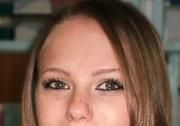Out of this world
Elizabeth Blaber has become the first Australian student to join the NASA Academy, where she will develop her doctoral research into the effects of space travel on the human body
Elizabeth Blaber has become the first Australian student to join the NASA Academy, where she will develop her doctoral research into the effects of space travel on the human body

New insights into the effects of weightlessness on human cell functions have won a talented UNSW doctoral student the Australian Space Prize.
Elizabeth Blaber, from the Australian Centre for Astrobiology, will now get to spend 10 weeks developing her research by working at the NASA Ames laboratory in California. She is the first Australian student to join the NASA Academy program and will realise a dream of working on a current NASA project.
The Prize, awarded by the Victorian Space Science Education Centre and NASA, was established to promote quality space-related research in Australia and raise awareness of study and career opportunities for students. Elizabeth will work with the Centre to share her experience with secondary students and teachers to inspire Australia's future scientists and engineers.
For her Honours thesis, supervised by Dr Brendan Burns, Elizabeth used simulated microgravity to investigate the responses of proteins in human stem cells and showed that weightlessness can have significant effects.
She found, for example, that anti-oxidant levels fell over time - a finding that may be relevant to why wounds heal more slowly in space. Astronauts can also lose skeletal mass and have reduced heart rate and erratic blood pressure.
Her research identified many proteins that can be correlated to systemic effects experienced in space conditions and may also yield insights into some ground-based medical problems, such as osteoporosis and some heart conditions.
"The VSSEC-NASA Australian Space Prize will permit me to collaborate and share ideas with other students from the field," says 21-year-old Elizabeth. "It will enable me to work on a topic that is of international interest, as well as affording me the opportunity to learn how to utilise state-of-the-art equipment to further enhance my research goals."
Contact: Dr Carol Oliver, UNSW Centre for Astrobiology | +61 2 9385 2061